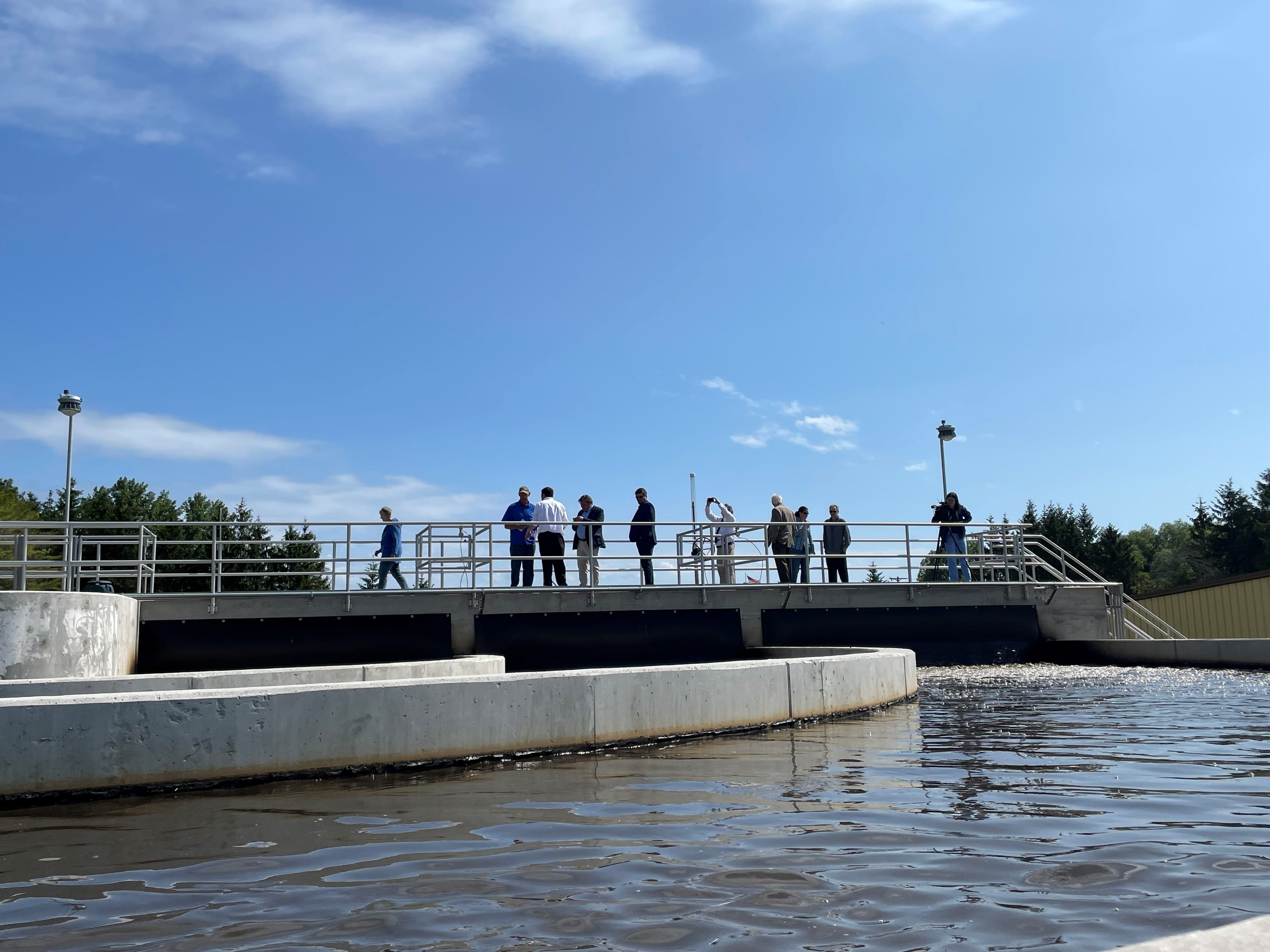As part of United for Infrastructure Week, today’s MI Environment story by Jeff Johnston of the Michigan Department of Environment, Great Lakes, and Energy (EGLE) is from the State of the Great Lakes report.
Local and state officials visit upgrades to the Cheboygan wastewater facility, which uses bacteria in place of chemical treatment, in summer 2023.
The City of Cheboygan’s wastewater treatment plant’s outdated 1970s technology, treatment processes, and equipment were to blame for numerous discharges of contaminated wastewater.
But no more.
In July 2023, the City opened a $17.4 million wastewater facility built with a low-interest loan and $5 million principal forgiveness through the Michigan Department of Environment, Great Lakes, and Energy (EGLE). The new plant safeguards the Great Lakes and protects human health, and the financing eases the burden on local ratepayers.
The administration of Gov. Gretchen Whitmer and Lt. Gov. Garlin Gilchrist, together with the Michigan Legislature, has prioritized rebuilding Michigan’s water infrastructure by working with communities and leveraging state and federal funds. In 2020, the governor announced the MI Clean Water Plan (MCWP) to address challenges including lead-laden drinking water lines, toxic contamination, undersized sewers, failing septic systems, unaffordable water rates, and more.
Since then, additional resources have been dedicated through resources including President Joe Biden’s Bipartisan Infrastructure Law and state fiscal recovery funds from the American Rescue Plan Act.
Some infrastructure projects, like Cheboygan’s, are highly visible. Others, like the removal of lead drinking water pipes in communities all over Michigan, end up out of sight. As of October 2023, Benton Harbor had replaced more than 4,500 lead water lines serving residents – 100% of the total.
MCWP grants in 2023 funded water main or lead service line replacement or other infrastructure in places like Detroit ($33 million), Highland Park ($10.1 million), Jackson ($8.4 million), Kalamazoo ($7 million), and Kingsford ($4.1 million). The Great Lakes Water Authority received $16 million to relocate water mains, the City of Pontiac received $12.75 million for sewage disposal improvements, and the City of Mount Pleasant received $9 million toward a $25 million upgrade of its Water Resource Recovery Facility. Full details are on the MCWP webpage.
In March 2022, Gov. Whitmer signed Michigan’s largest-ever infrastructure investment: the bipartisan Building Michigan Together Plan (Public Act 53), which totaled $4.7 billion across all of state government. Building Michigan Together allocated more than $1.9 billion over two fiscal years to EGLE for water improvements, including $1.27 billion to the state’s drinking water and wastewater and Clean Water State Revolving Fund (CWSRF) and Drinking Water State Revolving Fund (DWSRF).
Through those revolving funds, EGLE approved more than $932 million in loans in Fiscal Year (FY) 2023 for 71 wastewater, stormwater, and drinking water infrastructure projects – compared to $352 million and 29 projects just two years earlier. In all, the funds have now allocated over $6.3 billion to more than 700 projects since 1988 for CWSRF and more than $1.8 billion to over 420 projects since 1998 for DWSRF.
Not leaving out Michiganders with private wells, the state budgeted $5 million to provide free well water quality tests on request in 2023. Residents snapped up all 15,000 available tests within a week.
Other specific allocations include $233 million in FY 2023 for water infrastructure projects, $20 million in FY 2024 for environmental health projects in environmental justice communities, and $15 million in FY 2024 for the Water Use Program and groundwater funding.
Gov. Whitmer’s bipartisan 2024 “Make it in Michigan” state budget, passed by the Legislature in July 2023, dedicates another nearly $600 million for water infrastructure. The needs are great after decades of underfunding. It’s through sustained local efforts backed by state and federal support that Michigan will ensure future generations can enjoy clean and safe drinking water, uncontaminated waterways, and healthier and more resilient communities.

